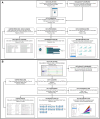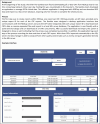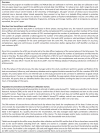Data Management in Multicountry Consortium Studies: The Enterics For Global Health (EFGH) Shigella Surveillance Study Example
- PMID: 38532952
- PMCID: PMC10962719
- DOI: 10.1093/ofid/ofad573
Data Management in Multicountry Consortium Studies: The Enterics For Global Health (EFGH) Shigella Surveillance Study Example
Abstract
Background: Rigorous data management systems and planning are essential to successful research projects, especially for large, multicountry consortium studies involving partnerships across multiple institutions. Here we describe the development and implementation of data management systems and procedures for the Enterics For Global Health (EFGH) Shigella surveillance study-a 7-country diarrhea surveillance study that will conduct facility-based surveillance concurrent with population-based enumeration and a health care utilization survey to estimate the incidence of Shigella--associated diarrhea in children 6 to 35 months old.
Methods: The goals of EFGH data management are to utilize the knowledge and experience of consortium members to collect high-quality data and ensure equity in access and decision-making. During the planning phase before study initiation, a working group of representatives from each EFGH country site, the coordination team, and other partners met regularly to develop the data management systems for the study.
Results: This resulted in the Data Management Plan, which included selecting REDCap and SurveyCTO as the primary database systems. Consequently, we laid out procedures for data processing and storage, study monitoring and reporting, data quality control and assurance activities, and data access. The data management system and associated real-time visualizations allow for rapid data cleaning activities and progress monitoring and will enable quicker time to analysis.
Conclusions: Experiences from this study will contribute toward enriching the sparse landscape of data management methods publications and serve as a case study for future studies seeking to collect and manage data consistently and rigorously while maintaining equitable access to and control of data.
Keywords: clinical research; consortium studies; data management; data quality; population enumeration.
© The Author(s) 2024. Published by Oxford University Press on behalf of Infectious Diseases Society of America.
Conflict of interest statement
Potential conflicts of interest. All authors: no reported conflicts of interest.
Figures



References
-
- Kotloff KL, Nataro JP, Blackwelder WC, et al. Burden and aetiology of diarrhoeal disease in infants and young children in developing countries (the Global Enteric Multicenter Study, GEMS): a prospective, case-control study. Lancet 2013; 382:209–22. - PubMed
Grants and funding
LinkOut - more resources
Full Text Sources
Miscellaneous

